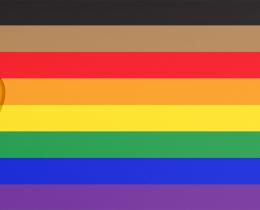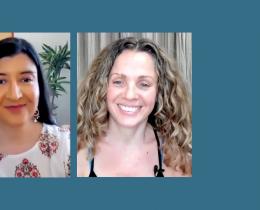Marianne: The Omega Women's Leadership Center (OWLC) is focused on encouraging more women in leadership and also helping create a new paradigm of power. How do you define power? What does power mean to you?
Anna: I think power is influence. It's not the same as physical power or atomic power or the power of the sun. I don't think we're talking like a physicist would talk, or an engineer. I think we mean influence. So it's really a metaphor. It's using the power to ask, ultimately, “What is a person's position and what can they do with it? And how can they alter it and the positions of others?”
Marianne: A lot of times people think of power as being hierarchical, whereas the OWLC is looking to help foster a transformation from “power over, to power with.” In other words, it’s not just about getting women to be leaders, but approaching the whole notion of power and leadership in a different way. What do you think are the ingredients for successful leadership? What type of leadership do you think the world needs now and what type of leadership do women need to cultivate?
Anna: Well, I just came back from the University of Pennsylvania, where I got an honorary degree. It was a very eclectic group of people and, interestingly, the president spoke to the new graduates about collaboration and connectivity, since they are the first truly connected generation. She spoke about how to make change and have power, influence, and effect. What will be required, she said, are new kinds of tools for collaboration than are currently being used. To me, that sounds right.
Marianne: What do you think is possible, especially when women, half of humanity, are emboldened and empowered?
Anna: I think we often have the expectation that women will humanize things, because part of what we've done historically is take care of people. Not just in our species, but the females in other species have done that, too. And so that instinct, which not all women have by any stretch of the imagination, is expected.
The whole movement towards microgrants—of giving women the opportunity to start businesses—has with it this notion that if you give a woman a little bit of money to start a business, it's going to go a long way because she's going to feed her children and take care of other people in the community. I think that right now if we look at broken communities, we do look at the investment in women to try to offer a solution to those communities. People tend to look at women and girls as a possible antidote to the sorts of violence that are perpetrated by men, both in terms of domestic violence and sexual violence, especially in places where there is unrest. So we think about giving women greater authenticity in those communities to try—we wish, we hope, we think—to adjust some of the violence that happens.
As I heard Hillary Clinton say, when men have difficulty asserting their own power, they often turn to abuse women to have the feeling of, what you talked about before, “power over.” I mean, I'm not a sociologist, so I don't know if that's true, but it sounds right to me and upsets me that there is that reality in the human condition. Because I would like to think that post-conflict, or after war, a whole community would join together to make itself better and heal itself, but we know that's not necessarily true. So I think in some of those kinds of very fragile and vulnerable communities, certain people in humanitarian, AIDS work, and so forth, are looking to women as a resource to make an adjustment.
Marianne: I think the hope is also that women will help represent “feminine” values.
Anna: But you know, we haven't seen that play out very well in the corporate world or in education to the extent that we would like it to. I'm not impressed that having more women in power in my generation has made it better for some of the people I care about. Young black people are going to jail at high rates in the generation that has put more women in power and decision-making positions. So I don't know that having more women in positions of authority has helped the United States of America develop an imagination that, for example, will claim that all children are our children. That breaks my heart, every day.
Yet, in the segregated community where I grew up, the best thing an educated woman could do was be a teacher. I think those female teachers took better care of us. I saw a whole lot of my mother's generation who were very, very dedicated to the idea that all children are our children. I don't see that so much anymore. I wish women did better, and I have trouble, in fact, with some of the events that I go to— and I'm probably the only person that's going to say this—that congratulate women, give them opportunities to network and leverage the power that they have, to have more power. I feel they could do more and I feel they need to do more, because what we're asking disenfranchised women to do is a lot more with fewer resources. And I would like women in power in this country to do a lot more than they're doing, to help others. It doesn't make me feel that great to go to events which are just about “them” getting more resources to climb.
Marianne: Why do you think that is? Do you think it's because women are ascribing to old, outmoded notions of what they should do with their power?
Anna: I think they are, and I think they've become extraordinarily concerned and interested in their families and their children and there are probably all kinds of pressures in our society to create that sense of coming in and closing down. And certainly in my circle I meet lots of women who extend out, but I would like to see them do that more. The more powerful the conglomeration of women is, the fewer women of color you see. Why haven't women of my generation done more to reach out across racial borders, not just class borders, but racial borders? If you went and did research on major corporations, I don't think you would find many women of color who would say they felt there was a lot of charitable action by women in power. If that were the case, there still wouldn't be diversity conferences.
Marianne: Do you think it's partly because all the different movements rarely interconnect or acknowledge the interdependence of their issues? For example, just women advocating for women's rights or minorities for minority rights. Does there just need to be more working together?
Anna: I think we are in a class society. I'm not saying anything new. And it's certainly something that a lot of people are talking about now, where the division between rich and poor is greater than ever and the middle class is dissolving. Even if we went to an event of affluent African-American women, I would have to interview them to know how much they're reaching out. People like to be with people like them. That might just be a human thing. I don't know. But I do feel that we are in desperate enough straits right now that those of us who have resources—not just money, but other kinds of know-how—need to step forward and put those resources to work where people are vulnerable.
I'm very interested now in how art can be better at being an innovative motor for social change and how social change can be an innovative motor for making art better. I'm sure a lot of my friends think, and sometimes I think, I'm foolish to be spending so much time on trying to bring people together around that matter, instead of just taking care of myself. But I can't stop myself from doing that. I'm not trying to congratulate myself. I can't stop myself from doing that because in my DNA is the generation before me and the one before that, where a sense of service was so critical to who my mother was and who my grandmother was. And I long for that. I long to be as kind as they were. But I don't think the culture that I'm in facilitates that kindness. There's just so much you can do in your lifetime and I find that I'm reverting back to wanting that again. I don't know if it will be respected. I don't think it matters in many parts of my career, at all, but I'll have to just let that go to be the person I want to be.
Marianne: I think part of coming into our power is discovering and honoring our own authentic voice and calling and leading our life from that place. Women always have so many messages coming at us that prevent us from doing this. How did you do it? Did this come to you naturally or was it something that you've had to work at? Because you've always seemed very confident and strong in terms of knowing your passion and who you are.
Anna: I think confidence is overrated. I mean, I'm riddled with guilt and uncertainty. I think I just learned how to manage that, so that I could try to be at least modestly productive. I would be more productive if I were more confident than I am. I think the notion of authenticity is maybe because I am different. I never was part of a clique or a clan and I've always been different, so maybe that is seen as authenticity? Because I'm different in so many ways. I'm a black actress, but when I started my career, I didn't look black enough. I'm an actress, but I'm equally as interested in writing. As you can tell, I'm very interested in social justice and I didn't just pop up like that a year ago. So I think when you're sort of on the outside, you don't have any choice but to be authentic, because that's who you are. Is it really authenticity, or is it just difference? You know what I mean? I’m not known as a mimic. I don't fit into a box. But I don't know—is that the same as authentic or is it just that I manage not fitting into a box?
Marianne: In looking at innovative ways of approaching activism, you were talking before about art. How do you view the connection between art and activism? What role does art have to play in changing the world?
Anna: I want to know more about that and how to make my art better, and how to reach different audiences with it and work outside of given institutions. To use that word collaboration again—I want to make collaborations with, unlikely collaborations with, people who are in the social justice community, because it's hard. A work that strives to speak for the neediest may lack authenticity.
There’s also the problem that we always are concerned that work that makes a social reach isn't good art. It's very hard, very hard. So I want to know more about how to cross those boundaries of excellence and social justice—commercialism and social justice. Why can't one make something that's going to sell and still make a difference and have meaning and reach out? Right? So that's what I spend a lot of time doing right now. I'm working on my organization Anna Deveare Smith Works, which is exactly about that. There isn't a day that goes by that I'm not doing something to just get that structured and funded, to get it going and to learn.
Marianne: You've always done that so well. You're also known for telling powerful stories, through interviews and your monologues. In talking about understanding other people's experiences, what do you think is the power of telling our stories?
Anna: Most of my work, because it's drama, is about crisis. I don't do plays about the beautiful beach, although I would love to [laughs]. I think the fact is that when people are caught in a crisis and I talk to them, they reveal to me that they have these extraordinary resources— intellectual resources, imaginations run rampant—that help them weave narrative that basically brings dignity and meaning back into their lives. And so that's a human drive. If you think something is absolutely upside down, like when I went to Katrina after the storm and I went to Rwanda after the genocide, or when I went to do my riot plays in Los Angeles and also in Crown Heights—people have to make sense of it. They have to feel better. So it's almost like a chemical thing when you hear that story. And then, in my case, recite it, re-say it. I learn about the brilliance of people who use their own storytelling to make themselves better, and who have the facility, productivity, and motivation to make the world around them better again. So I find listening to those stories helps me get an eye into a basic kind of human productivity.
Marianne: Omega’s work centers on awakening the best in the human spirit, acknowledging the role of body, mind, and spirit in each individual and the need to balance and blend all of these elements. How would you describe your own philosophy of life, or belief system, that helps guide you?
Anna: I do believe in body, mind, and spirit—all three are required to act. The fact that I had a chance to be in this art form has given me the biggest gift, which is to sometimes experience the three as a unity. I don't know if that's a philosophy. I think it is more that it does work and it is remarkable when the three things come together, whether that's while a person is singing, dancing, climbing, swimming, or surfing. I don't know why it ever got divided. It would be very interesting to know why anybody ever thought they had to define body, mind, and spirit as different because I think it is that we are the three. And you know really feeling alive is those sparks and moments where you have an awareness of all three, but all three are always operating. When you have a heightened awareness of body, mind, and spirit, it is quite something. By the way, it could be an exhilarating moment or a painful moment, when you have that awareness of all three. When you say that someone broke your heart, it is an awareness of all three.
Marianne: What is the one message you would most want to get out to women?
Anna: I would say to women, as you reach up, please reach out.



